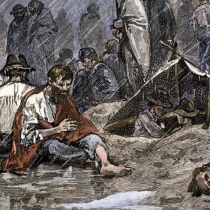Magazine

Diary of a Prisoner
A rare Civil War journal documents a Union soldier’s capture by Confederates and his struggle to survive notorious prisoner of war camps.
by Lara Zielin
John Kay left his family’s farm to enlist in the 6th Michigan Cavalry in October 1862. A year later, on October 11, 1863, he wrote to his parents to say he had been taken prisoner by Confederates at the Battle of Brandy Station in Virginia.
He then began a diary detailing life as a prisoner. The diary, now preserved at the Bentley, provides a firsthand look into life in the prison camps, as well as Kay’s physical and mental struggle to survive unthinkable conditions.
Kay’s first confinement was in an old warehouse in Richmond, Virginia, named Libby Prison. Its multiple floors were overpacked with prisoners. Almost immediately, Kay started to feel ill and believed bad drinking water from the nearby James River could be making him sick.
Even in his terrible state, he worried more for his family than himself. His twin brother, Thomas, was also serving in the Union Army, as was his oldest brother, Edward. He feared his mother was “sick on my account.”
The son of a Presbyterian preacher, Kay journaled about his faith and dependence on God. “Oh, the cruelty of this despotism that keeps us here, but vengeance belongs to God.”
By January 1864, Kay had been transferred to Georgia. “Alas my poor hopes (for release) are blasted. Early this morning we packed up and marched to Belle Isle—no tent and hardly enough to eat—my diarrhea as bad as ever, so I was quite weak when I got over here.”
Kay eventually managed to secure a tent, but not all of the prisoners were so lucky. He frequently lamented the “poor men” out in the elements with no protection.
When he was loaded into a boxcar on March 8, 1864, he wondered if it meant his release, but when the train went west, his spirits sank. “Oh, how cruel this disappointment,” he wrote.
Kay arrived in Andersonville Prison outside of Americus, Georgia, barely surviving the arduous journey with no water. Once there, he had no shelter and wrote that the men were “treated like cattle and sheep.”
“I am afraid this is going to be a bad place in hot weather,” he worried.
He estimated there were 15,000 men in the camp, and no doctors. The rations were minimal and contained no fruits or vegetables, making scurvy rampant. Still, Kay was quick to point out his good fortune. “I am thankful that I am so much better off than hundreds of others in this wretched place.”
In September 1864, Kay was transported to Charleston, South Carolina, then on to the Florence Stockade. The rations waned, and so did the length of his entries. Kay wrote about the weather and food almost exclusively, his penmanship increasingly shakier.
On December 11, Kay was finally transferred to a hospital in Annapolis, Maryland. “He had contended as long as possible against hunger, cold, and every kind of misery in those terrible prisons,” wrote Adeline M. Wallace, a nurse who cared for Kay. She wrote to Kay’s family after his death on December 15.
“He was gentle and patient, thanking me in so pleasant a manner for every little service I rendered him,” she wrote. “Toward night he prayed avidly, calling ‘Mother, Mother’ almost with his dying breath.”
The John B. Kay papers are open to the public.
